Activists Oppose Restrictive Voting Changes in North Carolina
Common Cause North Carolina is on a statewide tour to hold lawmakers accountable for extreme legislation.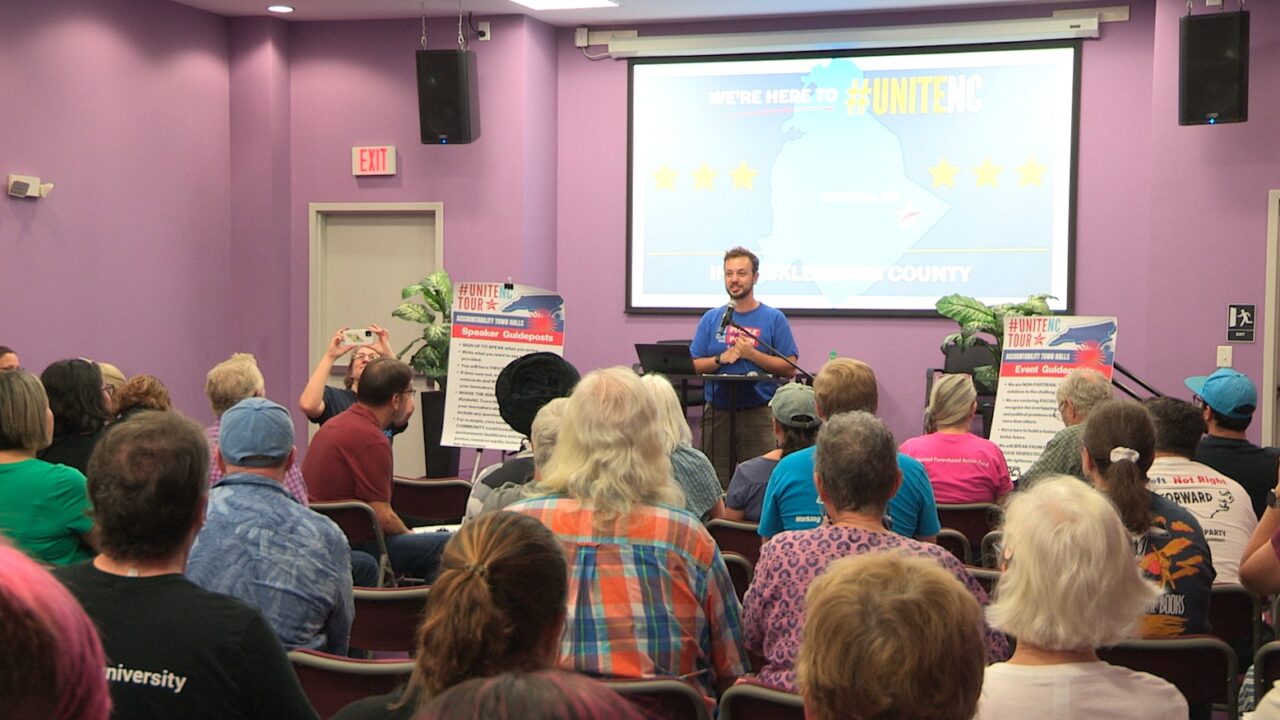 Gino Nuzzolillo of Common Cause N.C. speaks at a Unite N.C. tour stop in Mecklenburg County by Common Cause via Twitter / CC BY-SA 3.0
Gino Nuzzolillo of Common Cause N.C. speaks at a Unite N.C. tour stop in Mecklenburg County by Common Cause via Twitter / CC BY-SA 3.0
In July, the nonpartisan pro-democracy group Common Cause North Carolina began a statewide tour to hold state lawmakers accountable for extreme legislation, as the Republican-controlled General Assembly continues to push new measures that target access to reproductive healthcare, public education, environmental protections, rights for trans people, and access to the ballot.
The series of town halls have been endorsed by more than 30 progressive organizations across the state (including the Institute for Southern Studies, publisher of Facing South) who are working to educate and mobilize voters ahead of next year’s election.
“The #UniteNC Town Hall will remind lawmakers who they work for — and remind the public that we’re putting people over party in 2024,” said Gino Nuzzolillo, campaigns manager at Common Cause North Carolina, in a press statement. Through over 20 different events, the group aims to encourage people across North Carolina to organize and vote in response to the most recent raft of regressive legislation.
North Carolina’s Senate Bill 747 proposes a host of major changes to N.C. voting and elections.
Participants heard from community members, elected officials, and advocates who are concerned about the direction of the state legislature — and who implored voters to act. “It is time for us to get our hands dirty,” said High Point resident Mitzi Turner. “Go see what people are living like. Hold our representatives accountable for what they’re doing and not doing … Our power is at the polls.”
In Gibsonville, N.C., Mary Beth Murphy — a high school civics teacher and Guilford County Board of Commissioners member — spoke about the importance of staying engaged amid new attacks on democracy. “As a civics educator, I’m in this space tonight because I spend my life every day in and out of the classroom teaching my students about the importance of protecting our democracy by participating in it, by using their voices as their vote and to be engaged citizens,” Murphy said. “The current attacks on our democracy are incredibly troubling and disturbing, and I think that it’s going to take all of us standing together united in a singular voice, demanding that we protect our democracy.”
The tour is taking place as Republican lawmakers have adopted new restrictive voting legislation. In June, North Carolina lawmakers introduced a slate of anti-voter measures – Senate Bill 747, Senate Bill 749, and House Bill 772 – after formerly Democratic state Rep. Tricia Cotham (R) switched parties in April and gave Republicans a veto-proof majority in the state’s General Assembly. The North Carolina legislation follows a nationwide trend in Republican-led states of restricting voting access and giving GOP political leaders more control over the electoral process. According to the Brennan Center, 11 states have passed 13 restrictive voting laws, with notable legislation in Arkansas, Florida, Mississippi, and Texas.
North Carolina’s Senate Bill 747 proposes a host of major changes to N.C. voting and elections. The bill would prohibit local Boards of Elections from accepting grants to defray the cost of elections and give partisan poll observers greater access to polling sites, increasing their ability to intimidate or harass voters. The proposed law also ends the grace period for counting mailed absentee ballots. Under current law, mail-in ballots are counted as long as they are postmarked by Election Day and arrive at the county election office within three days. “Ending the three-day grace period would cruelly harm older voters, people with disabilities, rural voters and others who rely on mail-in absentee voting as a lifeline for exercising their right to vote,” said Bob Phillips, executive director of Common Cause North Carolina.
On Aug. 22, 27 organizations sent a letter to Democratic Gov. Roy Cooper calling on him to veto SB 747, arguing that it “dismantles trust in our elections by disenfranchising eligible North Carolina voters.” Cooper vetoed the bill two days later; Republicans have the votes to override the veto in the coming weeks.
While fiercely critical of the proposed voting restrictions and election changes, North Carolina democracy advocates say their efforts have helped ward off some of the worst proposals that have been floated in the General Assembly, and that the threat of lawsuits has deterred others. For example, some Republican lawmakers initially signaled their intention to make drastic cuts to early voting days and ultimately backtracked due to fear of litigation. “Shortening the early voting period is something I would very much support it,” Sen. Ralph Hise, who chairs the Senate’s elections committee, told WRAL. “But I think it’s been clear from the 4th Circuit [Court of Appeals], at this point, that … there’s not really a lot of options for us to go back at that point.”
Organizers of the Unite NC tour are hoping the town halls will help galvanize voters in their communities to stand against the election changes being proposed.
Similarly, Republicans had appeared poised to issue a blanket ban on any private monetary or in-kind support for elections, a key conservative talking point after Facebook and other entities helped fill election funding gaps in 2020. Senate Bill 725, a Republican bill passed in 2021 that was vetoed by Gov. Cooper, would have banned any in-kind or monetary support for county and state elections. But the version of the bill passed this year, SB 747, includes exceptions allowing county election boards to accept in-kind donations of the use of voting sites, food or beverages for precinct officials or other workers at the voting place, and ink pens and personal protection equipment to be used in an election.
Organizers of the Unite NC tour are hoping the town halls will help galvanize voters in their communities to stand against the election changes being proposed, and highlight their impact as North Carolina moves into the 2024 elections, which will feature contests for president, governor, Congress, the legislature, and other key state offices.
“It’s easy for lawmakers to ignore us in Raleigh,” Nuzzolillo told Facing South. “It’s much harder when constituents show up in their own backyard to make their voices heard. And every time constituents get to speak, they are unequivocal: The agenda of state politicians is opposed to the agenda of everyday North Carolinians.” The next stop of the tour will be in Hendersonville on September 5.
(For more information on the town halls, visit https://www.commoncause.org/north-carolina/unitenc/.)
Your support matters…Independent journalism is under threat and overshadowed by heavily funded mainstream media.
You can help level the playing field. Become a member.
Your tax-deductible contribution keeps us digging beneath the headlines to give you thought-provoking, investigative reporting and analysis that unearths what's really happening- without compromise.
Give today to support our courageous, independent journalists.
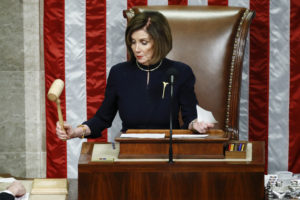
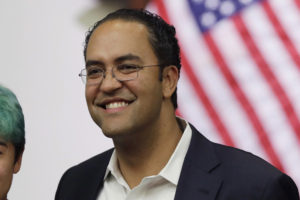
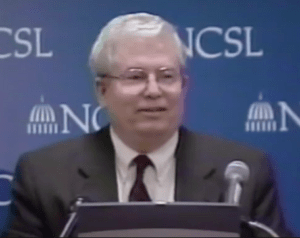
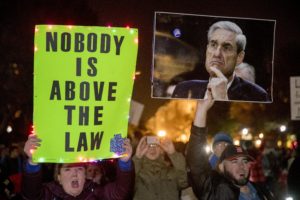
You need to be a supporter to comment.
There are currently no responses to this article.
Be the first to respond.